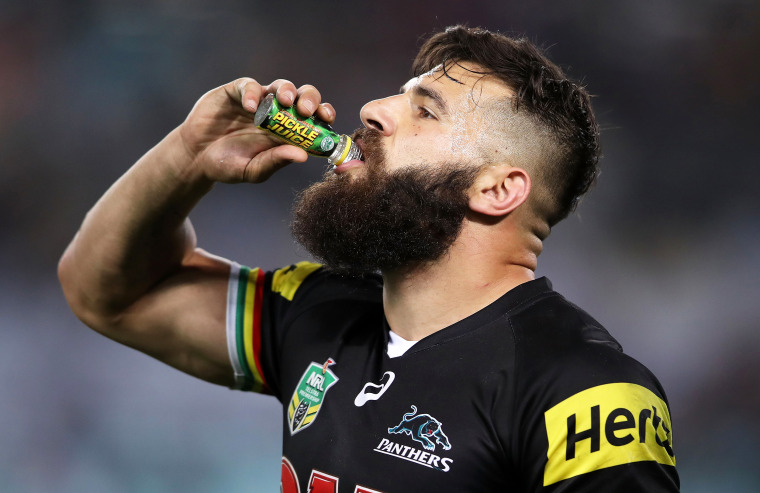A sports doctor calls it “an age-old remedy.”

Pickle juice, the common liquid found in the jar of gherkins in your refrigerator, is gaining popularity internationally.
Commentators noted that tennis star Carlos Alcaraz was consuming pickle juice during the tough, nearly five-hour final match when he won Wimbledon in July 2023.
The University of Michigan Hepatology Program’s Dr. Elliot Tapper, a liver specialist, claims his phone “blew up” as it was happening. He has been researching how pickle juice affects muscle cramps and has discovered that a few sips can lessen their intensity.
One of Dr. Jordan Metzl’s favorite topics is the use of pickle juice as an anti-cramping agent while exercising. He practices sports medicine at the Hospital for Special Surgery in New York.
Pickle juice reduces cramps for what reason?
According to the National Library of Medicine, muscle cramps, which are abrupt, involuntary, and frequently painful muscular contractions, are highly prevalent and frequently occur after exercise or during night. Usually, they affect the arms, hands, abdomen, legs, and feet.
Alcaraz dropped a crucial match at the French Open weeks before he won Wimbledon because he “started to cramp (in) every part of my body,” the player told ESPN.
After observing cyclists and other athletes using prickly brine to relieve muscle cramps, Tapper started investigating the remedy.

Commentators noted that tennis star Carlos Alcaraz was consuming pickle juice during the tough, nearly five-hour final match when he won Wimbledon in July 2023.
The University of Michigan Hepatology Program’s Dr. Elliot Tapper, a liver specialist, claims his phone “blew up” as it was happening. He has been researching how pickle juice affects muscle cramps and has discovered that a few sips can lessen their intensity.
One of Dr. Jordan Metzl’s favorite topics is the use of pickle juice as an anti-cramping agent while exercising. He practices sports medicine at the Hospital for Special Surgery in New York.
Pickle juice reduces cramps for what reason?
According to the National Library of Medicine, muscle cramps, which are abrupt, involuntary, and frequently painful muscular contractions, are highly prevalent and frequently occur after exercise or during night. Usually, they affect the arms, hands, abdomen, legs, and feet.
Alcaraz dropped a crucial match at the French Open weeks before he won Wimbledon because he “started to cramp (in) every part of my body,” the player told ESPN.
After observing cyclists and other athletes using prickly brine to relieve muscle cramps, Tapper started investigating the remedy.
His research, which appeared in The American Journal of Gastroenterology in 2022, focused on liver-damaged individuals who frequently suffer from incapacitating muscle cramps.
In the research, compared to 40% of patients who drank water, over 70% of patients who drank pickle juice after a cramping episode started reported that the cramps subsided.
Because the mechanism is the same, the findings would apply to anyone who has muscle cramps, according to Tapper.
The effect is caused by the acid in the brine stimulating a nerve reflex in the throat and occurs before the pickle juice even reaches the stomach, he explains, contrary to popular belief that athletes consume pickle juice to increase their levels of electrolytes.
There is a nerve receptor in the back of the throat that is sensitive to acid, and it splashes when acid enters the mouth. According to Tapper, when that receptor fires, it sends a message to the spinal cord, which is where the cramp is occurring.
“It’s basically a loop of a nerve firing. The indication then changes to “Stop.”
Muscle cramps are stopped in the moment by pickle juice rather than being prevented from occurring, according to Tapper.
But according to Metzl, pickle juice’s high salt level helps people who are exercising, especially in hot, humid conditions when they sweat a lot, by replenishing electrolytes.
“A big part of preventing muscle cramping from happening is getting them to replenish their electrolytes,” he explains. Although drinking salty water isn’t usually very appealing, dill pickle juice has long been used as a cure-all.
What dosage of pickle juice is recommended?
Just one drink, around a tablespoon, as long as it splashes the back of the neck, and it must come from pickles made with vinegar because the acid is essential, according to Tapper.
He continues, “You’ve need to be near pickle juice to make this work. “You have to figure out a way to keep it on your person if you’re someone who cramps in the middle of a tennis match.”
Try filling a small shot glass, advises Metzl.
According to Matthew Black, a licensed dietitian at Ohio State Wexner Medical Center, there are two kinds of pickle juice.
One is a salt and water mixture that causes fermentation and contains probiotics, which are healthy bacteria.
The alternative option is a salt-and-vinegar mixture that is neither fermented nor contains probiotics.
Black warned against drinking any pickle juice because of their high salt level.
Most Americans consume excessive amounts of salt, which is linked to high blood pressure. Heart disease risk consequently rises as a result of that.
According to Black, the probiotics in fermented pickle juice may help to maintain healthy levels of gut flora. But for that aim, he advises drinking other fermented, less salty foods like yogurt and kefir.
Nevertheless, according to Tapper, one tablespoon of pickle juice is a straightforward, secure, and affordable treatment that doesn’t include a lot of sodium. He and Metzl concur that they would advise others to try it if they experienced muscle cramps.





